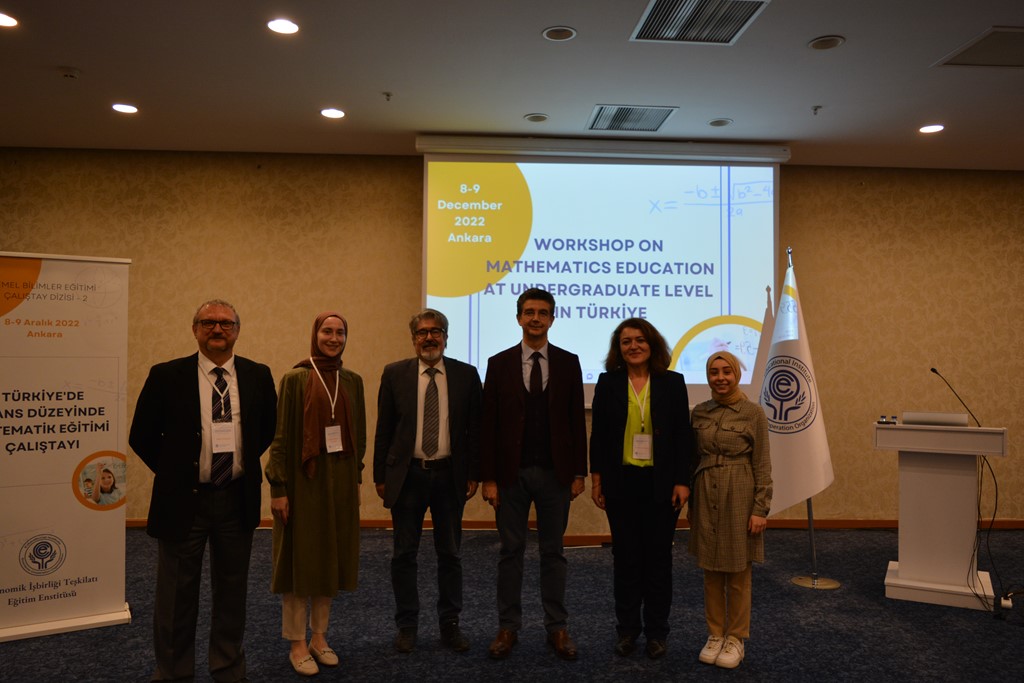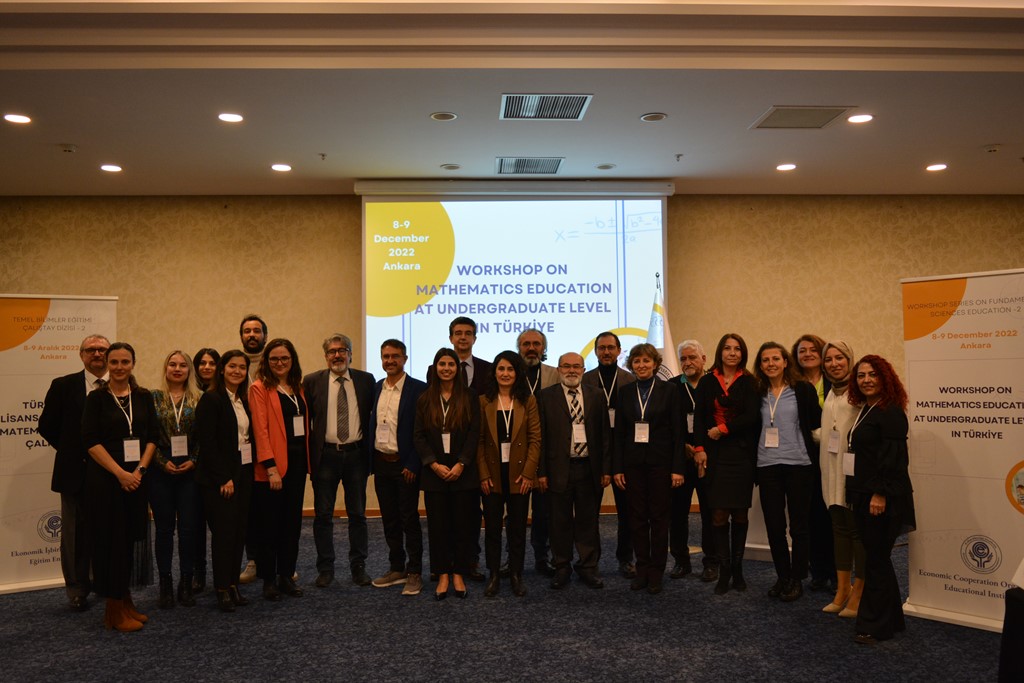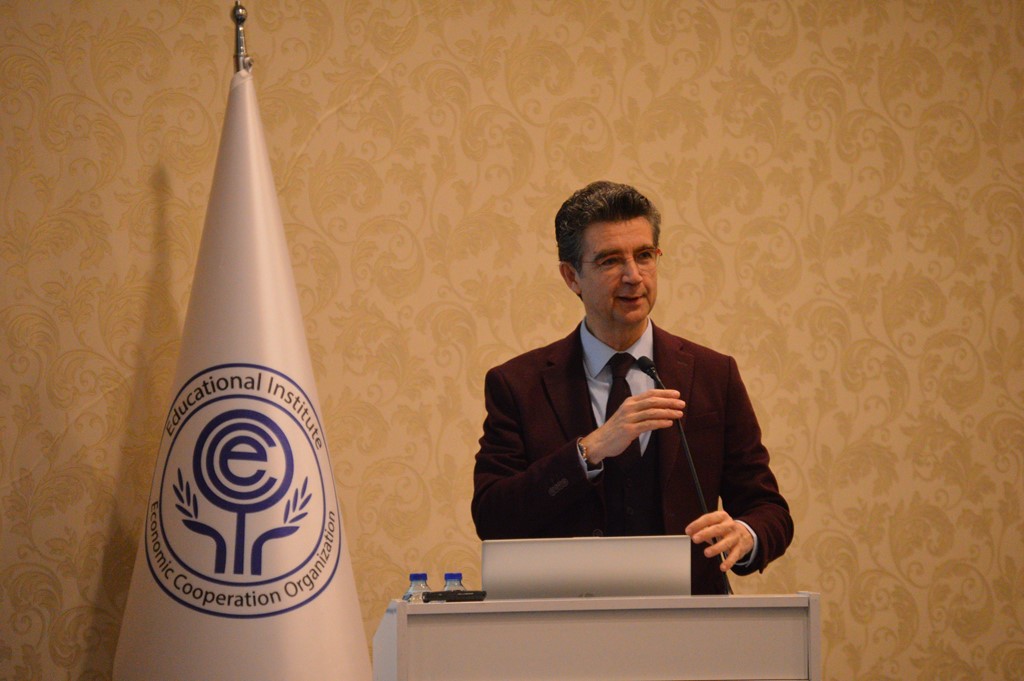In this workshop, several academicians and students from universities come together to discuss the state, strengths, and weaknesses of mathematics education at undergraduate level in Türkiye and talk about possible recommendations and areas that need improving. On the first day, academicians and students from mathematics department held their presentations, and on the second day, speakers from mathematics education departments presented their topics. This workshop is the first of its kind in Türkiye that brings together professionals from mathematics and mathematics education departments to discuss the state of mathematics education at undergraduate level in the country and talk about possible solutions.
10 presentations on mathematics education were held during the two days of the workshop. Each session was followed by a Q&A Session, where the other speakers and the audience had the chance to ask questions, discuss the topic, and provide valuable input.
The workshop started with the opening speech of President of ECOEI Prof. Dr. M. Akif Kireçci, who introduced the Institute and its activities, and underlined the significant role of mathematics education for economic, scientific, and technical progress. His speech was followed by the opening speech of Prof. Dr. Ahmet Arıkan from Gazi University.
The first presentation was held by Tuğba Pakel, graduate student from Ankara University with the title “Ideas of a student about education in mathematics departments”. One of the issues that she identifies is that there are too many topics that have to be covered in a short period of time. To improve mathematics education, she suggests reducing subject content and adjusting the curriculum. She also highlights the need for reassessing the duration of class periods and to think of ways to save time. Providing students with resources, like lecture notes, books, and presentations is also helpful, so that they can come prepared to classes, focus more on listening to and understanding the subject, rather than note taking, and go over the covered subjects after class. Students also wish for application courses, as they are helpful in learning and practicing to solve questions. In application courses, a student-oriented environment is created where they can ask questions, exchange ideas, and explore their curiosity and creativity.
In the fourth session, Prof. Dr. Naim Tuğlu from Gazi University Mathematics Department highlights the importance of logic and reasoning in mathematics education. According to, Prof. Tuğlu, logic and reasoning are the foundation of mathematics, and that mathematics cannot be done without these two. He argues that with logic, reasoning and judgment, students develop their ability to inquire and investigate, and question the information given to them, instead of relying on sole memorization. It also helps them to reach the most accurate solutions to the problems they encounter in real life settings. As problems of the current education model for mathematics, he identifies the following two points: Education based on rote memorization, far from logic and reasoning, and test-based measurement methods. Students are not told how the correct answer is reached and which factors cause the wrong answer. In test-based measurement methods, finding the right result and finding it as fast as possible is the only goal, but how you get there is not important. Mathematics teaching at universities, on the other hand, is more about how to get to the result rather than the result itself. So, there are serious differences between the type of mathematics education at school and at university. As a result, students who come to the mathematics departments of universities to learn mathematics with enthusiasm, end up being frustrated and disappointed because of the difference between their high school and university education, their lack of logic lessons, their serious deficiencies in reasoning, their inability to do mathematical thinking, and their hard time learning math. This situation leads to a loss of motivation of students and faculty members. His suggestions are preparing proposals for changes in the high school curriculum, explaining the importance of logic and reasoning to students within the scope of orientation activities for new students, preparing activities and exercises for students on logic and reasoning, and explaining proof methods more effectively.
In the last session of the day, Assoc. Prof. Dr. Handan Köse from Ahi Evran University held a presentation titled “Motivation to Interpret and Model Mathematics”. As problem areas that have to be worked on she identifies course contents and the curriculum, linking lessons to the real world, and motivation. She points out that especially courses with emphasis on Applied Mathematics are not associated with real life in any way. Although not every concept or every problem can be related to real life, the teaching process should be carried out by giving examples that are interesting and make sense of the subject. Another issue is that no work is done to arouse the curiosity of the students, like organizing seminars, and writing projects. Students should be encouraged to produce projects suitable for the current era. So, in order to keep the motivation of students high, interviews, seminars, math days, etc. should be organized. They should be given the opportunity to take part in social projects that will develop their curiosity about mathematics. Educators should not be faced with difficulties when it comes to supporting and financing their projects. She concludes that it is important that the teaching staff at the faculties have to be ready to implement change.
The second day started with the presentation of Dilara Dişlek from Gazi University. She provided an evaluation of the curriculum from the perspective of an undergraduate student. When it comes to the curriculum, she voiced some of the students’ dissatisfactions, for example the lack of application, the distribution of courses and the inability to choose area electives. The problems she detected is that a lot of the knowledge taught is only theoretical and the concept does not get fully grasped by students. The teaching process is also too teacher-centered, and students are not given the chance to be active during class. As a result, teachers who find it difficult to apply what they have learned are being raised. She also highlighted the importance of learning English and exchange programs like Erasmus+ for the academic and personal development of students. Lastly, she voiced concerns regarding master programs and some inequalities when it comes to the eligibility criteria. Primary mathematics students can also apply to the Mathematics Teaching Master's program which is a cause for concern for mathematics teacher education students because they generally have lower GPA’s than elementary mathematics teacher education students, perhaps due to the influence of the content of the courses or the professors. This causes elementary mathematics students being ahead of mathematics teaching students in the ranking. Lastly, she wished for more research assistant positions, so that students can also pursue an academic career.
Prof. Dr. Erdinç Çakıroğlu from METU gave a speech on the fundamentals, problems, and future of mathematics teacher training approaches. He claims that on average, Türkiye does not provide a strong enough education in basic skills which should be acquired by the whole society. To survive and compete in the global arena, the proportion of individuals with high-level skills needs to increase. So, students who are creative, productive, entrepreneurial, flexible thinkers, who bring creative solutions to difficult problems, are able to generate new knowledge and learn mathematics as a useful tool that can be adapted to different circumstances need to be raised. He points out some factors that are related to low student achievement. One of them is the environment where the school is located and the role models in the environment of the student. The family, their educational status, the importance they attach to education, and the environment and opportunities they provide also plays a role in this. Student achievement is also affected by the opportunities provided by the school, the teacher, the quality of the courses, the school culture, and by how children feel at school, if they feel valued or undervalued at school. His recommendation is to increase quality learning opportunities and to ensure that every student has fair access to these opportunities on country/region, school, and class level.
The third session was held by Prof. Dr. Şenol Dost from Hacettepe University in which he explored the question how much mathematics a teacher should know, what the quality of this mathematical knowledge should be, and how it effects the students’ success. He identifies six types of knowledge a teacher should have which are content knowledge, pedagogical content knowledge, curricular content knowledge, general pedagogical knowledge, information about students and their characteristics and knowledge about the educational environment. In his presentation, Prof. Dost shared some of the concerns of teacher candidates, such as inadequate application, too much emphasis on memorization, the amount of content, and the difficulty to make connections between topics. Some students also said that they do not think that some courses will be useful to them in the future or contribute to their professional life. Prof. Dost highlighted the importance of mathematics content knowledge as it provides a deep understanding of mathematical concepts, has a great impact on students’ success, makes it easier to prepare lesson plans, and aids the detection of misconceptions A good background knowledge of mathematics also helps students to gain problem solving skills, and the ability to use different strategies and reasoning skills. Through solid mathematics content knowledge, students can make connections between mathematical content and other mathematical subjects, develop affective skills, mathematical intelligence, thinking and perspective, and learn how to create a balance between content and teaching.
Prof. Dr. Selami Ercan from Gazi University talked about “Mathematics Education: Problems and Solutions in the Context of Elective Courses and Teaching Practice”. When it comes to elective courses, he suggests to not put elective courses that contribute to the professional teaching knowledge of the students and courses on general culture in one pool. Course contents should be created by taking into account today's technology and in a way that helps the professional development of mathematics teachers. General Knowledge elective courses should also be related to mathematics, for example a mathematics and art course instead of an art and aesthetics course. Another point that he discusses is teaching practice. The main problems encountered in teaching practice can be listed as follows: Students not being able to actually lecture, students only solving problems during lectures, and students' lack of attendance to class.
Assoc. Prof. Dr. Baki Şahin from Muğla Sıtkı Koçman University gave a presentation about mathematics teaching programs and problems. He shared some of the opinions, concerns and problems of students at mathematic departments. As suggestions he proposes that the creation of mathematics curricula should be left to the universities, and universities should prepare their curricula in consultation with their relevant partners. He also advises that some lecturers who are an expert in a specific field should be able to give courses in more than one program, so that students in more than one program can benefit from his knowledge. Lastly, he pointed out how a math teacher should be trained. According to him, a good mathematics teacher should have good content knowledge, pedagogical knowledge, and general culture knowledge. The priority should be on content knowledge. When preparing and implementing the content of the curriculum, the focus should be on raising students who learn maths by doing, not by memorizing. Teacher candidates should be selected from those students who are willing and capable of teaching. He wishes for graduates who fulfill the requirements to be appointed without an exam.
The research team consisting of Selami Ercan from Gazi University, Asst. Prof. Hatice Aydan Kaplan from Gazi University, and Asst. Prof. Emine Nur Ünveren Bilgiç from Düzce University have documented the findings of the workshop which will be published in the form of a report in Turkish and English. The next workshops in the Workshop Series on Fundamental Sciences Education will be about Chemistry and Biology and are planned for 2023.






